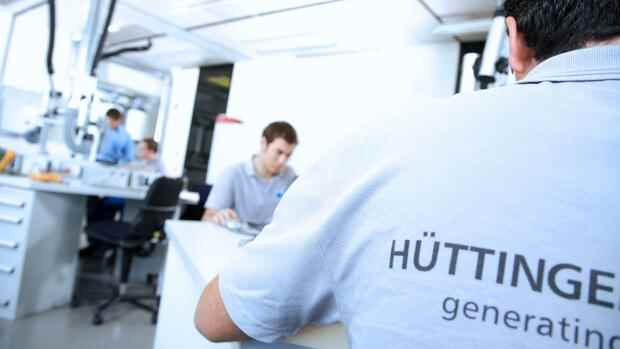Freiburg As a laser specialist, the German medium-sized company Trumpf is one of the international market and technology leaders. The electronics subsidiary Hüttinger is one of the guarantors of success. The Freiburg company builds high-tech generators – the power sources for Trumpf’s lasers.
“Unsexy gray boxes,” she calls Rafal Bugyi, head of Trumpf Hüttinger for two years. But without the process power supply for these gray boxes, the latest generations of processor chips could not be coated. Plasma-based surface coatings and electrothermal heating tasks (induction) are the company’s domain.
This also includes inverters for solar technology and growing silicon carbide crystals with induction generators. Silicon carbide is a key material for the expansion of electric mobility. Power electronics with chips made from this material increases the range of a battery by up to eight percent and enables significantly faster charging.
All areas of Hüttinger are growing strongly, the semiconductor business in particular. With digitization in all areas of life from smartphones and cloud data centers to autonomous driving, the entire chip industry, which has been subject to fluctuations in the past, is facing a long-term and dynamic upward trend.
Top jobs of the day
Find the best jobs now and
be notified by email.
All major chip manufacturers such as Intel, TSMC or Samsung are planning several new chip factories, each worth hundreds of billions. This is another reason why business in Freiburg is currently booming: many manufacturers of the production systems rely on generators from Trumpf-Hüttinger.
>> Read also: Europe’s most valuable tech group expects an endless boom
“In the current fiscal year, we will again generate sales of well over 300 million euros with growth of over 25 percent,” says Bugyi. And it looks like the Trumpf daughter is continuing to thrive at this pace. At the end of January, incoming orders were even a third up on the previous year. Hüttinger is currently one of the main sources of income at Trumpf.
Poland as an important location
The medium-sized company took over the company from southern Baden 30 years ago because its high-precision medium-frequency and high-frequency generators are irreplaceable for the tailor-made power supply of the carbon dioxide lasers in the machine tools produced. 40 percent of the Hüttinger turnover still comes from internal business with the mother of the family company.
Boss Rafal Bugyi is manager, scientist and founder in one person. The electrical engineer comes from Warsaw and has a Hungarian father. As an enthusiastic technician, he was already tinkering with controls for electric cars when he was at university. Bugyi was later one of the founders of the Polish electronics manufacturer Advanced Converters, a direct current specialist that was acquired by Trumpf-Hüttinger in 2007.
“Back then in Poland, we made a conscious decision to sell to a family business because we saw better development opportunities there,” says the 55-year-old. Today 720 people work for Hüttinger in Poland. Like Freiburg, where 500 employees work, the plant in Warsaw contributes half to the business success.
The 55-year-old has been Managing Director at Trumpf-Hüttinger since January 2020.
(Photo: TRUMPF Group)
“The electronics business area in Freiburg and Warsaw is a central component of the Trumpf portfolio,” confirms Trumpf boss Nicola Leibinger-Kammüller to the Handelsblatt. “It will have a great future in terms of semiconductor production and the use of renewable energies.”
But the entrepreneur doesn’t just focus on numbers: “In addition to the business aspects, I’m happy about the close connection between Germany and Poland that we live in electronics.” Leibinger-Kammüller sees the integration of the Eastern European company in Trumpf-Hüttinger as a success Example of East-West cooperation. Thanks to the location in Warsaw, Trumpf also benefits from the technical knowledge of the excellent Polish universities.
Lockdowns slow growth
Hüttinger boss Bugyi looks at the war in Ukraine with concern. He commutes frequently between his places of residence Freiburg and Warsaw. In Poland, the Russian threat was perceived much earlier and more directly than in Germany. Bugyi does not believe that the war will end quickly.
Meanwhile, the pandemic-related lockdowns in China are more relevant to the economic success of Trumpf-Hüttinger. “We could grow much faster,” explains the Hüttinger boss. The supply bottlenecks at the suppliers limit the expansion accordingly. But in the long term, the chances of this could hardly be better.
>> Read also: Atomic mirrors should enable the next generation of chips
That was not always so. In the middle of the last decade, business was so sluggish that 50 jobs had to be cut. But the semiconductor and solar business brought the turning point. The managing director at the time, Stephan Mayer, was involved in the turnaround. For him, the Freiburg station became a stepping stone. As a non-family manager, Mayer has meanwhile been promoted to the Trumpf Executive Board and is responsible for the entire China business.
The company produces on the outskirts of Freiburg and in Poland.
(Photo: TRUMPF Group)
This year, the workforce, the Trumpf mother and the founding family, who still hold ten percent of the company, are celebrating the company’s 100th birthday at his old place of work in Freiburg. Engineer Fritz Hüttinger founded the company in 1922, built electrical equipment and later specialized in medical devices. The first high-vacuum amplifier tubes were manufactured in Freiburg in the mid-1930s. They were used to generate, amplify and model electrical signals. Generators have become the main business over the decades.
In Freiburg, the name Hüttinger is an institution. The Fritz Hüttinger Foundation promotes new technologies – the professorship for energy-efficient high-frequency electronics at the Institute for Sustainable Systems at the University of Freiburg bears the founder’s name. And the company headquarters in the industrial area on the outskirts of the Black Forest metropolis is also a landmark with its unusual architecture for connoisseurs.
More: This is how Trumpf is campaigning for high-tech billions from the federal government
